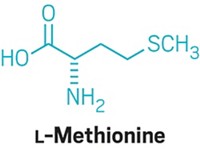Advertisement
Grab your lab coat. Let's get started
Welcome!
Welcome!
Create an account below to get 6 C&EN articles per month, receive newsletters and more - all free.
It seems this is your first time logging in online. Please enter the following information to continue.
As an ACS member you automatically get access to this site. All we need is few more details to create your reading experience.
Not you? Sign in with a different account.
Not you? Sign in with a different account.
ERROR 1
ERROR 1
ERROR 2
ERROR 2
ERROR 2
ERROR 2
ERROR 2
Password and Confirm password must match.
If you have an ACS member number, please enter it here so we can link this account to your membership. (optional)
ERROR 2
ACS values your privacy. By submitting your information, you are gaining access to C&EN and subscribing to our weekly newsletter. We use the information you provide to make your reading experience better, and we will never sell your data to third party members.
Business
Evonik gets biobased methionine technology
German firm seeks to supplement synthetic production of animal feed amino acid
by Michael McCoy
November 14, 2016
| A version of this story appeared in
Volume 94, Issue 45
Evonik Industries, a German chemical company that is a major producer of amino acids for animal nutrition, is venturing into one of the field’s final frontiers: fermentation-based production of methionine.

Evonik has submitted a bid to acquire the methionine fermentation technology of the French biotech company Metabolic Explorer. Details weren’t disclosed, although Metabolic Explorer says the proposed price represents at least half of its market capitalization—today about $63 million—over the past two years.
Most animal-feed amino acids, including lysine, threonine, and tryptophan, are produced by fermentation. Methionine is an exception because it contains sulfur, making it difficult for engineered microorganisms to express in large quantities.
Instead, Evonik and other firms make methionine via a complex chemical synthesis involving hard-to-handle raw materials such as methyl mercaptan, carbon disulfide, and hydrogen cyanide. Global methionine sales are more than $3 billion annually, according to Metabolic Explorer.
CJ CheilJedang and Arkema took an initial step toward biobased methionine last year when they opened a $400 million plant in Malaysia that produces the amino acid by combining a fermentation-derived intermediate from CJ with methyl mercaptan from Arkema.
Metabolic Explorer, in contrast, says its process is entirely biobased. The company has been developing it since the 2000s. It had a commercialization agreement with the starch giant Roquette, but that ended in 2014. Following the sale, Metabolic Explorer will continue efforts to develop biobased propanediol and propylene glycol.



Join the conversation
Contact the reporter
Submit a Letter to the Editor for publication
Engage with us on Twitter